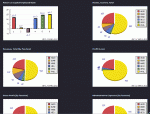It’s time to challenge your stereotypes! Here’s what first springs to my mind when I think of these professions:
A Formula One racing driver: fireproof overalls, helmet tucked under one arm, cocky stance and arrogant smile on his face.
A high court lawyer: hand tailored suit, leather briefcase, slightly otherworldly air and nose in the air.
A corporate analyst: reserved, uncomfortable in the real world, an abacus on the desk, smart clothes but never truly smart in demeanour.
Hang on a minute… an abacus?? A slightly sharper look at the corporate analyst and a somewhat Pythagorean figure emerges, complete with wraparound white sheet and funny pointy beard.
This is because corporate analysts are, at the end of the day, brilliant mathematicians whose mental agility would flummox the rest of us humble human beings. They’re the gods of all number crunchers.
Hence, I suppose, the abacus: to help with the day-to-day shuffling around of figures in analysis of a company or product’s performance. But surely we’ve progressed beyond such oddities by now?
In a universe far far away…
In 1986, Big Bang happened in the City of London. Information Technology arrived and swept away centuries of tradition in favour of a Thacherite meritocracy of liberalised markets.
At about the same time, the HyperText Markup Language was starting to evolve somewhere in the bowels of the European Organisation for Nuclear Research, commonly known as CERN.
This is HTML, the foundation of the World Wide Web which allows information to be published in electronic form without worrying about how or from where someone reading that information may be accessing it.
However HTML is static in its elements, so while it’s great for displaying information it’s not much use for defining it. Thus the Extensible Markup Language was born, or XML.
This is a specification from which customised languages can be built. These languages are often used to send messages between computers, again without worrying about the precise nature or location of those computers.
One well known version of XML is Really Simply Syndication, or RSS, which is now the news carrier of choice on the Web. Another is HL7, which is widely used in the NHS to communicate medical information around the UK.
The Extensible Business Reporting Language
A third example is the Extensible Business Reporting Language, or XBRL. This has been developed over several years as an electronic replacement for paper based report filing.
It has been enthusiastically embraced by various regulators around the world, including Japan, Europe and South Africa.
In mid-May the USA joined this club as the Securities and Exchange Commission (SEC) announced a phased introduction of it as mandatory system for filing corporate accounts.
After mid December, public companies with a turnover above $5bn will now have to use XBRL to file their reports. Progressively smaller companies are expected to be set compliance deadlines in subsequent phases.
With Companies House already accepting XBRL submissions and HMRC investigating it for the submission of tax returns, a similar announcement in the UK cannot be too far away.
Good news for everyone (nearly)
The beauty of XML based information is that it can be easily queried and analysed. Data is held in its smallest, most atomic form meaning it can be mined and compared with a degree of ease not seen before.
For example, the comparison of a derived indicator which some companies may report directly and others may not, analysts may have had to wade through an office block of reports.
Now they will be able to get the same data with a simple electronic query. The chances are they’ll have a fancy tool which will store the data in a spreadsheet and draw a pretty graph as well.
In addition, GRI has now started work on implementing the G3 standard within the XBRL framework. Once completed this will make it far easier for companies to engage in sustainability reporting, bringing it and financial reporting ever closer together.
So it’s good news all round. Companies will be able to pull data directly from their management systems while analysts will be able to spend more time analysing and less time page turning.
In addition, the increase in data accessibility will ensure greater transparency of company operations as it becomes easier to compare metrics and discover who is not reporting in certain areas.
The one sector which may not benefit is abacus manufacturers. It’s over 20 years since Big Bang, but finally it would appear the ripples of internet technology have reached this vital corner of the City.
Endnote: KPMG have an excellent XBRL Introduction and Tutorial on their US website. It requires Internet Explorer to run.
A former CTO, Chris has a broad and varied background. He’s been involved with blue chips, consultancies & SMEs across a wide variety of sectors and has worked in Europe, the Middle East and Australia.
In 2007 he decided to combine his knowledge of business and IT with his passion for all things sustainable and has been busy writing ever since. However, his greatest ambition remains to brew the perfect cup of coffee.



